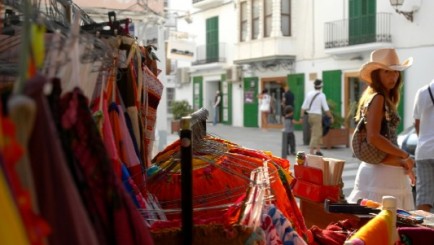
Shopping and tourism naturally go hand-in-hand, and Spain is hoping to nurture that relationship further.
The things that Spain does well – better than any other country in fact – are largely rooted in its natural assets. Its beaches are glorious, its weather more so, and its landscape and close proximity to the UK make it a perennial favourite for all types of tourists…
But there are a number of other, man-made attractions that Spain is a world-leader at. It boasts world-beating restaurants, delicious and affordable tapas, excellent wines, affordable and varied property, world-class hotels, a rich history, superlative golf and some of the most legendary nightlife found anywhere on the planet.
But what Spain is also rather good at is shopping, or rather, providing shoppers with exceptional choice, value and quality. And it is this strength that the country’s Deputy Prime Minister Soraya Sáenz de Santamaría wants to tap into in order to end the “bipolarity and seasonal nature” of the Spanish economy.
Busy and bustling and booming during the long summer months, the Spanish economy draws strength from its tourism, but Santamaría wants to extend this season right through into the quieter months between November and April – and believes shopping is the way to go.
“We have to open the riches of tourism to other sectors of the economy to end the bipolarity and seasonal nature posed by alternatives such as the sun and beach,” she said.
These alternatives include making shopping in Spain a more attractive experience by streamlining the process of returning VAT to non-EU shoppers, implementing a computer-based system to register purchases and thus offer better after-sales and customer service, and sprucing up some of the shopping districts and malls in the country’s most popular resorts and cities.
The deputy minister was speaking at the World Tourism Organization’s first ever summit on shopping tourism, where the World Travel and Tourism Council (WTTC) revealed the true extent of the relationship between retail and tourism in Spain.
According to the WTTC, tourism accounts for 15% of Spain’s GDP, with shopping at 18% – and a wide overlap between those two industries of around 6-7%. The WTTC also revealed that Madrid is one of the world’s top ten shopping destinations, and Santamaría wants to extend that accolade to Barcelona and Málaga – the latter a region of particular potential due to its location at the heart of Spain’s most popular tourism centres of the Costa del Sol.
In the fashion world, Spanish chain Zara is one of the leading high street names, offering affordable and stylish clothing that suits all kinds of tastes and budgets. Spain’s recovering economy has also convinced Swedish furniture maker Ikea to double its number of stores in the country by 2025, rising from 16 currently to 32 within a decade.
And British sofa giant DFS last week announced that it is to open its first ever non-UK store in Alicante in order to meet a growing demand among British expats for its goods – a move that will further enhance Spain’s reputation as a destination where you really can get it all…
 en
en



 Vlaams-Nederlands
Vlaams-Nederlands
0 Comments
Leave a Comment
DISCLAIMER
The opinions and comments expressed by contributors to this Blog are theirs alone and do not necessarily reflect the views of VIVA Homes Under the Sun Ltd, any of its associated companies, or employees; nor is VIVA to be held responsible or accountable for the accuracy of any of the information supplied.
Have you got something to say?